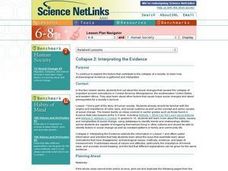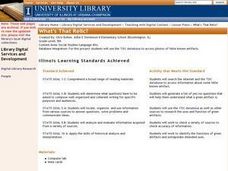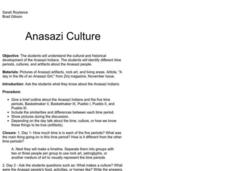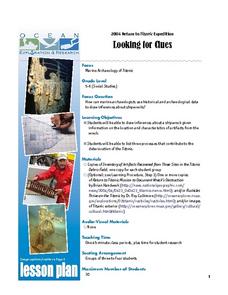Curated OER
Read Martin's Big Words
Students read Martin's Big Words. In this social studies lesson, students read and discuss the life and times of Dr. Martin Luther King Jr.
Curated OER
Haniwa
Pupils use non-fired clay and posterboards to create and display examples of Haniwa and kofun in this exciting lesson for the Social Studies, Humanities, Asian Studies, or Art classroom.
Curated OER
BIRDS OF A FEATHER
Learners observe and identify characteristics of artifacts and fossils; explain how artifacts and fossils are used to explore the past; and identify ways that Native Americans prepared food and made tools
Curated OER
You Don't Know What You've Got Until It's Found
Learners consider what can be learned through the study of artifacts, focusing on those of ancient Egypt. They research famous ancient Egyptian sites to prepare for the development of proposals for exhibits in a fictional museum.
Curated OER
Spice It Up!
Students analyze visual artifacts from Asian descent and follow the path of famous explorers on the Silk Road. For this Asian artifacts lesson plan, students use their senses to explore and grind spices using a mortar and pestle.
Curated OER
Science NetLinks: Collapse 2: Interpreting the Evidence
Pupils continue to explore the factors that contribute to the collapse of a society; they also explore how archaeological evidence is gathered and interpreted. Students explore about the social changes that caused the collapse of...
Curated OER
The Anasazi
Sixth graders investigate and determine the origins of the ancient Anasazi who inhabited present-day Utah and the Four-Corners-Region, after receiving direct instruction and carrying out activities in cooperative group settings. They...
Curated OER
Treasures Along the Silk Roads
Ninth graders examine the travels of the Silk road. For this Ancient China lesson, 9th graders analyze slides of artifacts as cultural and social representations of the Silk Road civilizations. Students create a word map and creative...
Curated OER
Show Me a Flowerpot
Students compare and contrast handmade and machine-made products in a study about the evolution of production processes in American history. In this production history lesson, students explore a flowerpot in depth. Students make their...
Curated OER
Inca Artifacts and Civilization Lesson Plans
By learning about Inca artifacts and this ancient civilization students can delve into history, geography, and much more.
Curated OER
Treasures of the Silk Roads
Students examine and discuss art objects from the Silk Roads. They analyze images of artifacts, create a word map, and develop and write a short story or poem based on the slides viewed.
Curated OER
What's That Relic?
Fifth graders listen to a read aloud of David Mc Cauley's book Motel of the Mysteries. They discuss an unknown artifact and decide what it might be used for. They research other artifacts and play "What's that Relic?"
Curated OER
Anasazi Culture
Students explain the cultural and historical development of the Anasazi Indians. They identify different time periods, cultures, and artifacts about the Anasazi people.
Curated OER
Introduction to Native Americans Thematic Unit
Students consider different cultural viewpoints. In this Native American history lesson, students examine artifacts and then conduct research on selected Native American tribes.
Curated OER
Lesson plan: Archaeology - Its Methods and Use
Students study the field of archeology. In this archeology activity, students participate in 12 activities that require them to examine archeology, garbology, artifacts, ethical issues, and field specific vocabulary.
Curated OER
What's in the Soil?
Second graders create stratified soil levels using pictures. For this earth science lesson, 2nd graders identify "artifacts" from 3 historic eras and divide them into 3 soil levels. Then they draw their own multi-level soil profile and...
Curated OER
Ancient Egypt/Mummification/Preservation
Sixth graders identify characteristics of preserved artifact, distinguish between an example and non-example of a preserved artifact, and connect the definition of preserve to the Egyptian art of mummification.
Curated OER
Titanic: Looking for Clues
Students make inferences about a shipwreck based on the location of artifacts. They role play as marine archaeologists and list three processes that contribute to the deterioration of the Titanic.
Curated OER
Jamestown Fort: Finding History
Students identify artifacts discovered from the exploration of the Jamestown fort in order to help them create a short fictional account about the lives of Jamestown's first inhabitants. In this history lesson, students research the...
Curated OER
Shipwreck Mystery
Students study web pages on a shipwreck then locate where this took place on a map. In this marine archaeologist lesson students examine what clues archaeologists use to find the location of a shipwreck and what they might find.
Curated OER
Introduction of Primary Sources
First graders create two personal artifacts to add to a primary source shoebox that represents information about themselves. The first draw a self-portrait then build an artifact from Play-Doh and pipe cleaners to represent something...
Curated OER
Louisiana Treasures Worksheet
In this family treasures worksheet, students explore 2 linked websites to look at artifacts and find an object that appeals to them about which they will brainstorm the object's use, value, and what it says about Louisiana. Students use...
Curated OER
Relative Dating in Archaeology
Students create a timeline that explains how ancient cultures used artifacts. In this Relative Dating in Archaeology lesson, students examine artifacts and draw conclusions about their origins. Then students analyze antiquated objects or...
Curated OER
Lesson Plan: Touring The Alamo
Students discover the size of the Alamo and artifacts of the time period by navigating through a virtual tour of the Alamo.

























